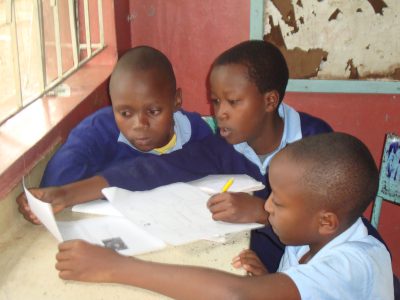By
James Ouma
It is 9 am. The shrill sound of a woman arguing with her husband blares from the twin-speakers of a small transistor radio as 14 year-old Blessing Adote prepares for this year’s KCPE. Blessing and his younger siblings live with his family in their single-iron-roomed house in Congo, Kawangware.
Blessing has witnessed his parents bring forth five more children, each of whom he has baby sat when he is out of school due to lack of school uniform, exam fees and when his asthma gets worse.
As Blessing turns another page, the sound of squeaking rusty metal bed springs is heard as Blessing’s father, who works as a security guard at a private school along Ngong Road, tosses and turns in his sleep. Because his father wants the door and windows to remain shut, Blessing has to read using the flickering light coming from a tin lamp as he tries to make up for the loss caused by the current strike by teachers.
“Doesn’t this bother you?” I ask.
“Not in any way,” he replies. “I have become used to strikes by studying and doing homework on my own.”
Though Blessing has gotten used to seeing teachers go on strike in the past years, this particular strike threatens his performance in the biggest exam in his primary school education. In 2003, Blessing was two years old when Mwai Kibaki abolished school fees in the nation’s 20,000 public primary schools.
Twelve years later, Blessing and thousands of other public primary school children are out of school due to the stand-off between teachers and the government concerning a salary increment they had been promised by previous governments where President Uhuru Kenyatta and members of the Jubilee government had served as cabinet ministers and members of parliament.
It is a confusing time for children who have become victims of our collective gullibility, greed and lack of concern for their welfare. Much as the president would like us to believe that there is no money to pay teachers in public schools, I doubt the commitment of our political leaders who are always on the forefront to pass bills that are meant to increase their allowances and salaries.
One wonders what would happen if the same leaders would offer to take a cut in their salaries so it can be used to pay teachers. But then again, common sense isn’t something that can be associated with Kenyan politics and leadership. And as education experts across the world ponder over the results of UNESCO’s Education for All Global Monitoring Report, it is safe to say that meeting the goal of global universal primary education by 2015 was a pipe dream and a Christmas balloon whose deflation has come full circle with the constant stand-off between teachers and the government.
Just like all the political pledges that are normally made during election campaigns, the free primary education gravy train is grinding to an unproductive halt. Most political pledges are never translated into policy frameworks that have sustained adequate resources and personnel.
In the public schools I have visited, masses of children overflow in classes that are inadequately provided for, teachers are poorly motivated, parents don’t know what goes on in school, while the political class revels in playing ping-pong with the future of the nation’s children. Subjecting children to a scenario where the same adults they spend most time with have to go on a strike to be paid is denying children their basic rights.
Instead of seeking to provide laptops, President Uhuru Kenyatta should have built on the initial achievements that Mwai Kibaki’s government had made with free primary education. Most beneficiaries of the laptop project walk to school barefoot, wear torn school uniforms, write on torn exercise books, can’t afford text books that keep changing every day and go hungry while others study under trees.
Most school libraries are filled to the ceiling with discarded text books that are rendered obsolete every year as the Kenya Institute of Education approves and disapproves text books at will. The Kenyan education’s fortunes will only change when parents take an interest in their children’s education.
Parents should address the state of Kenya’s free education by investing their time, energy and resources in developing their children’s schools instead of waiting for teachers and the government to do so. Parents should also seek to ask the tough questions that will catch the attention of the political class whose intention is profiting from their political life spans. This is the only way parents can help the likes of Blessing Adote and thousands of children studying in public schools.



No Comments Yet!
You can be first to comment this post!